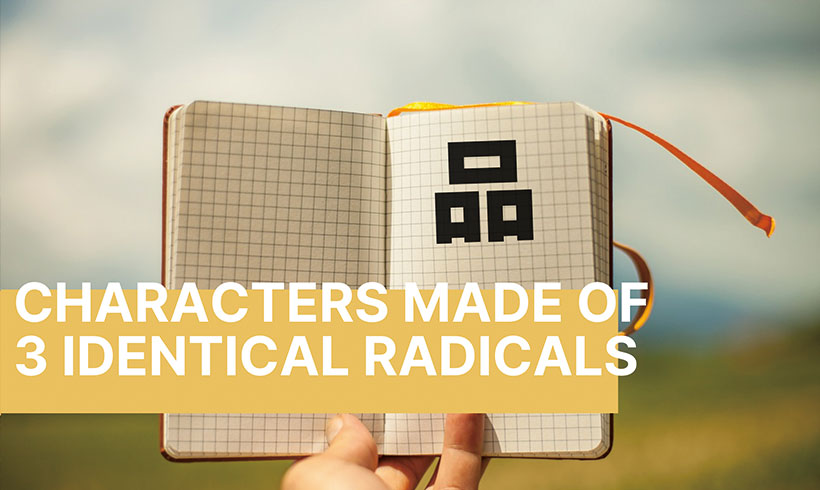There is a special group of Chinese characters which consist of three identical parts. This character structure is called 品字结构 (pǐnzì jiégòu). In general, these characters are rarely used in daily life, and mostly seen in ancient Chinese literature. However, there are still some characters which people come across fairly often.
In this article, we are going to have a look at some commonly-used characters that are made of 3 identical radicals.
1. 众 (zhòng)

众 (zhòng) consists of three individuals 人 (rén, “person”) and can be easily recognized as the word for “people”. You can guess from the structure of this character that its meaning has something to do with “many people”, many 人.
Nowadays, this character is often combined with another character to form words meaning “a lot of…”, such as 众多 (zhòng duō, “numerous”), and 大众 (dà zhòng, “the masses”).
2. 晶 (jīng)

晶(jīng) consists of three “日(rì)”, which means “the sun”. When we are talking about the sun, the first thing that usually comes to our mind is a bright and warm atmosphere. In fact, 晶(jīng) is often used to describe something shining or glorious like 水晶 (shuǐ jīng, “crystal”).
In addition, it can be also used to create long adjectives with a similar meaning, such as “晶莹剔透(jīng yíng tì tòu) – sparkling and crystal-clear”.
3. 森(sēn)

木 (mù) means “wood”, and it’s used as a radical for characters relating to plants like “树(shù)”, which means tree. The structure of this character implies that it contains a lot of trees. Consequently, one can easily deduce that the meaning of this character is “forest”, which is written as “森林(sēn lín)” in Chinese.
4. 磊 (leǐ)

磊 (leǐ) consists of three individual 石 (shí, “stone”). The structure of this character resembles a pile of stones, and the meaning behind that is considered to be “steady, indestructible”.
There is a well-known idiom 光明磊落 (guāng míng lěi luò), which means “to be open in all one’s actions, have nothing to hide”. It’s often used to describe a person’s attitude when dealing with different matters.
[If you like this post, you can also have a look at the article about Chinese Polyphones.]
What other 品字结构 do you know?
Share your thoughts in comments – or tweet us at @thatsmandarin!









0 Comments